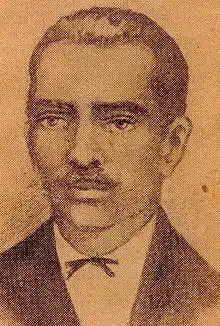José Joaquín Puello
José Joaquín Puello de Castro (Santo Domingo, 1805/1808–ibid., 23 December 1847) was a general and government minister from the Dominican Republic. He and his brothers, Gabino and Eusebio, were the only prominent black Dominicans in the Dominican War of Independence.
José Joaquín Puello | |
|---|---|
 | |
| Born | c. 1805 Santo Domingo, Santo Domingo |
| Died | December 23, 1847 Santo Domingo, Dominican Republic |
| Allegiance | |
| Service/ | |
| Rank | General |
| Battles/wars | Dominican War of Independence |
Biography
Puello was former colonel in the Haitian Army;[1][2][3] when the Independence was proclaimed on 27 February 1844 he was made part of the Central Independent Government (CIG) since he was very popular among mulattoes and blacks in order to allay fears and rumors regarding an alleged restoration of slavery by the independence plotters. [3] Before the involvement of Puello and his afro-descendant brothers with the secret society of La Trinitaria organized by Juan Pablo Duarte to attain its independence from Haiti, the majority of the population of African descent considered it a white supremacists organization because it was composed strictly of white middle class Dominican men.[4] Juan Pablo Duarte's uncle suggested he should reach out to prominent Black leaders to gain the confidence of the people and help make the movement a reality. Therefore, Duarte made the important connection with Los Puellos who helped make the independence of the nation a reality. He was suggested by General Pedro Santana, and then, appointed by the CIG, as Military Commander of Santo Domingo.[1][2]
On 16 July 1844, General Pedro Santana led a coup d'état and assumed the CIG’s Presidency. Puello’s refusal to face the coup against President Francisco del Rosario Sánchez favored the victory of the coup.[5] President Santana appointed him as minister of Treasury and Commerce and promoted him to the rank of General. Following the ratification of the first constitution in November 1844, Puello was made governor of the Santo Domingo Province.[3]
In the 1845 Haitian invasion, Puello had an important role in the Battle of Estrelleta that forced the Haitian retreat. However, his alignment with the liberals gained him enemies among the conservative-ruled government; the Consul of France, Eustache Juchereau de Saint-Denys, called him prejudiced against France and an enemy of the whites.[1][2][3]
The Puello brothers were indicted on charges of instigating an anti-white revolution in the country and ingratitude to the white race; they were judged in absentia.[1][2][3] José Joaquín and Gabino were sentenced to death by the twenty-five-man jury and executed by a firing squad on 23 December 1847;[1][2][3] Eusebio was sentenced to three years in prison and the loss of his military rank (Lieutenant Colonel), however, shortly after he was released and reinstated into the military.[6]
References
- FUNGLODE. "José Joaquín Puello" (in Spanish). Enciclopedia de Historia y Cultura del Caribe. Archived from the original on 31 December 2014. Retrieved 31 December 2014.
{{cite web}}: CS1 maint: unfit URL (link) - Appiah, Kwame Anthony; Gates, Henry Louis, eds. (2005). Africana:The Encyclopedia of the African and African American Experience. Oxford University Press. p. 452. ISBN 0195170555. Retrieved 31 December 2014.
- Franco Pichardo, Franklin (2006). Historia del Pueblo Dominicano (in Spanish). Ediciones Talleres. pp. 199, 212, 222–224. ISBN 99934-33-56-X.
- Franklin, Franko (2012). La Población Dominicana: Razas, Clases, Mestizaje y Migraciones (in Spanish) (1st ed.). Santo Domingo: Universidad Autónoma de Santo Domingo. pp. 353–354. ISBN 978-9945-447-86-6.
- Tineo, Héctor. "Con el apoyo del cónsul de Francia Pedro Santana toma el control de la Junta Central Gubernativa". Vanguardia del Pueblo (in Spanish). Dominican Liberation’s Party. Retrieved 31 December 2014.
- FUNGLODE. "Eusebio Puello" (in Spanish). Enciclopedia de Historia y Cultura del Caribe. Archived from the original on 31 December 2014. Retrieved 31 December 2014.
{{cite web}}: CS1 maint: unfit URL (link)
Further reading
- Garrido, Víctor (1974). Los Puello (PDF) (in Spanish) (ii ed.). Santo Domingo: Secretaría de Estado de Educación, Bellas Artes y Cultos.